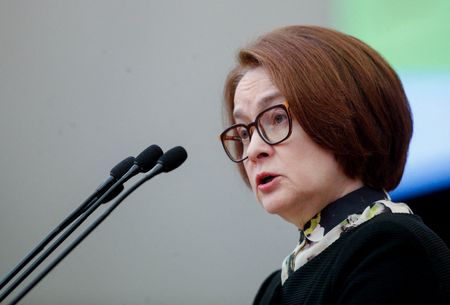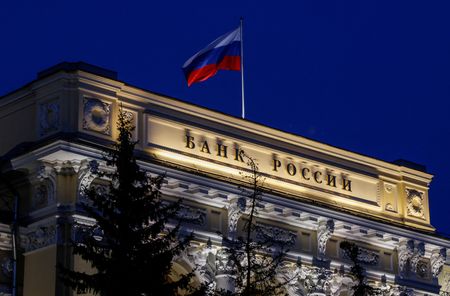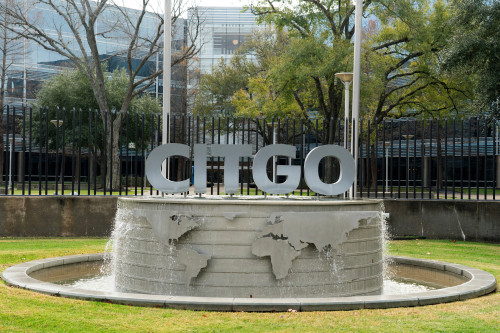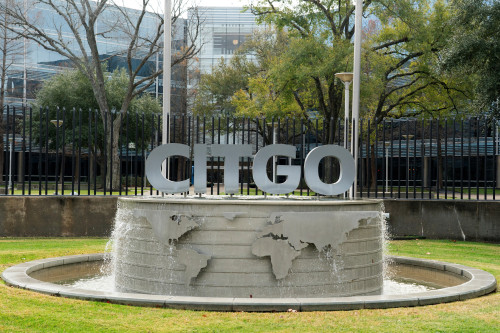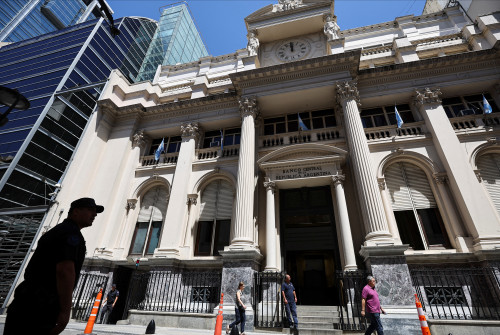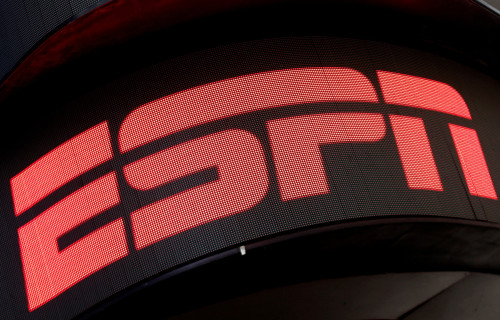By Vladimir Soldatkin, Elena Fabrichnaya and Alexander Marrow
MOSCOW (Reuters) – Russia’s central bank held its key interest rate at 7.5% on Friday, keeping the need for rate hikes on the table over lingering inflationary risks and flagging demand-side factors that could threaten its goal of returning inflation to target.
Governor Elvira Nabiullina said the bank had only considered a hold or a hike, seeing no grounds to ease monetary policy for now.
The rouble, whose recent weakening has also fed inflation, leapt around 2.5% after the decision to a three-week high against the dollar.
In a series of rate cuts last year, the bank gradually reversed an emergency hike to 20% made in late February 2022 after Russia despatched tens of thousands of troops to Ukraine and the West imposed sanctions on Moscow in response.
It has now held rates steady at 7.5% since the last cut in September, but has adopted an increasingly hawkish stance, pointing to inflationary risks from high and unanchored inflation expectations, significant labour shortages and Russia’s wide budget deficit.
The bank said it would consider hiking rates in upcoming meetings to stabilise inflation close to its 4% target in 2024.
Annual inflation, which spiked to over 20-year highs in 2022, slowed to 2.55% as of April 24 as last year’s base effect took hold.
But Nabiullina said this was a temporary factor and did not mean the bank had achieved its goal of returning inflation to its 4% target. Rates could be hiked to offset any signs of accelerating inflation that might threaten returning it to 4% in 2024, she said.
“The rate forecast looks quite aggressive and concerns about inflation risks have increased,” said Alfa Bank Chief Economist Natalia Orlova.
UPDATED FORECASTS
The Bank of Russia improved its estimate for Russia’s economic growth to a range of 0.5-2.0% from a maximum of 1% envisaged previously. Nabiullina said a rebound in consumer demand and an economic recovery could see inflationary pressure intensify.
The International Monetary Fund also forecasts economic growth for Russia in 2023, following a 2.1% decline last year, though Western attempts to isolate it and lower energy revenues are seen dampening prospects for years to come.
The bank also lowered its year-end inflation forecast to 4.5-6.5% from 5.0-7.0% and revised downward its forecast for Russia’s 2023 current account surplus, to $47 billion from $66 billion.
“Increasing foreign trade and financial restrictions can further weaken demand for Russian exports, contributing to inflation through exchange rate movements,” the bank said in a statement.
The decision to hold rates was in line with a Reuters poll.
“The Bank of Russia has somewhat tightened its signal on future actions,” said Mikhail Vasilyev, chief analyst at Sovcombank, forecasting rate hikes totalling 150 basis points this year.
The next rate-setting meeting is scheduled for June 9.
(Reporting by Reuters; Writing by Alexander Marrow; Editing by Andrew Osborn, Louise Heavens and Emelia Sithole-Matarise)

